Yearn to uncover the mysteries of the celestial legions of angels in the Bible, a journey into divine realms awaits.
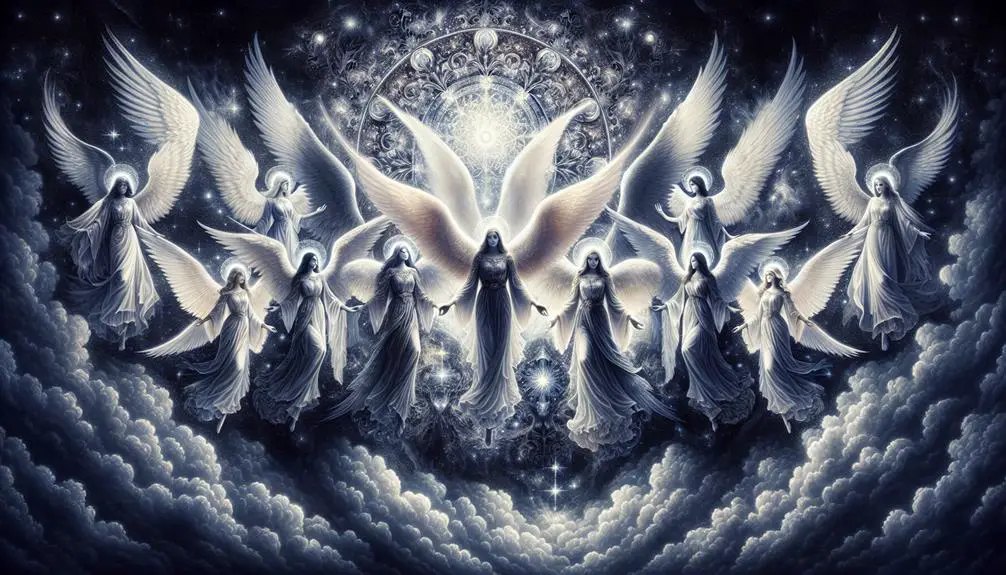
Legion of Angels in the Bible
Like stars in the sky, the concept of legions of angels in the Bible illuminates the spiritual landscape of scripture with awe and wonder. You've likely come across references to these celestial beings, from the guardian angels watching over individuals to the mighty warriors in the Book of Revelation.
But have you ever paused to consider their intricate roles and the layers of meaning behind their appearances? As we explore this celestial hierarchy and the stories of divine intervention, you'll find yourself on the edge of a vast, uncharted territory, eager to uncover more about these messengers and protectors whose presence weaves through the fabric of biblical history.
Key Takeaways
- Angels operate within a structured hierarchy, reflecting their roles and authority in the celestial realm.
- Guardian angels play a critical role in providing protection and guidance to individuals.
- Angelic beings participate in heavenly warfare, influencing earthly events and outcomes.
- Angels serve as messengers, delivering divine prophecies and visions crucial to human destiny.
The Concept of Angelic Legions
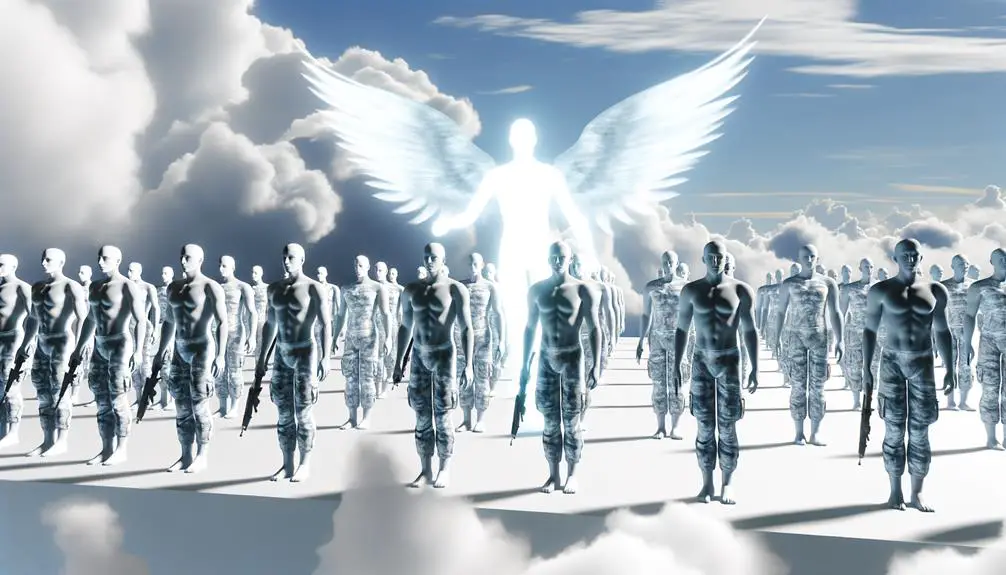
The concept of angelic legions introduces a structured hierarchy within the celestial entities described in biblical texts, emphasizing their roles in divine governance and spiritual warfare. This structured order, often referred to as the angelic hierarchy, delineates a complex system of ranks and duties among angels, illustrating a meticulously organized celestial orders framework. You'll find that this hierarchy isn't merely for symbolic representation but serves as a functional organization that reflects the divine order and authority in the heavenly realm.
Analyzing the angelic hierarchy, you encounter various tiers of celestial beings, each with specific roles and responsibilities. These tiers are often categorized into three major orders or spheres, with each sphere encompassing different types of angels, such as seraphim, cherubim, and thrones in the first sphere, dominions, virtues, and powers in the second, and principalities, archangels, and angels in the third. This classification not only highlights the diversity among the angelic beings but also underscores their distinct roles in executing God's will and maintaining the cosmic balance.
The concept of angelic legions and the detailed celestial orders underscore a significant aspect of divine governance. Through this structured hierarchy, you grasp the extent of organization and purpose among the heavenly beings. It's a testament to the complexity and depth of divine order, where each angelic being plays a pivotal role in the grand scheme of spiritual warfare and governance. This analytical exploration into the angelic hierarchy illuminates the multifaceted roles that these celestial entities play in biblical narratives, offering a deeper understanding of their significance in the spiritual realm.
Guardian Angels in Scripture

Within biblical texts, guardian angels emerge as pivotal figures, entrusted with the protection and guidance of individuals, revealing a deeply personal aspect of divine care and intervention. These celestial beings act as intermediaries between the divine realm and humanity, playing a crucial role in personal encounters and angelic guidance throughout the scriptures. The concept of guardian angels in the Bible isn't just a singular verse but a theme that underscores the relationship between divine protection and human experience.
When analyzing guardian angels in scripture, several key points stand out:
- Personal Guidance: Instances in the Bible highlight how guardian angels provide personal guidance, navigating individuals through challenging circumstances and towards their divine destiny.
- Protective Role: They serve as protectors, shielding individuals from physical and spiritual harm, exemplifying God's commitment to safeguard His people.
- Messengers of God: Guardian angels act as God's messengers, delivering divine messages to individuals, facilitating a direct form of communication between the human and divine.
- Spiritual Encounters: They play a pivotal role in spiritual encounters, often initiating transformative experiences that deepen one's faith and understanding of the spiritual realm.
These aspects underscore the significance of guardian angels as not merely mythological entities but as integral components of biblical theology that exemplify God's care for humanity. Through personal encounters and angelic guidance, individuals are led towards paths of righteousness, redemption, and deeper spiritual insight, illustrating the multifaceted roles guardian angels play in the divine narrative woven throughout scripture.
Angels in the Book of Revelation
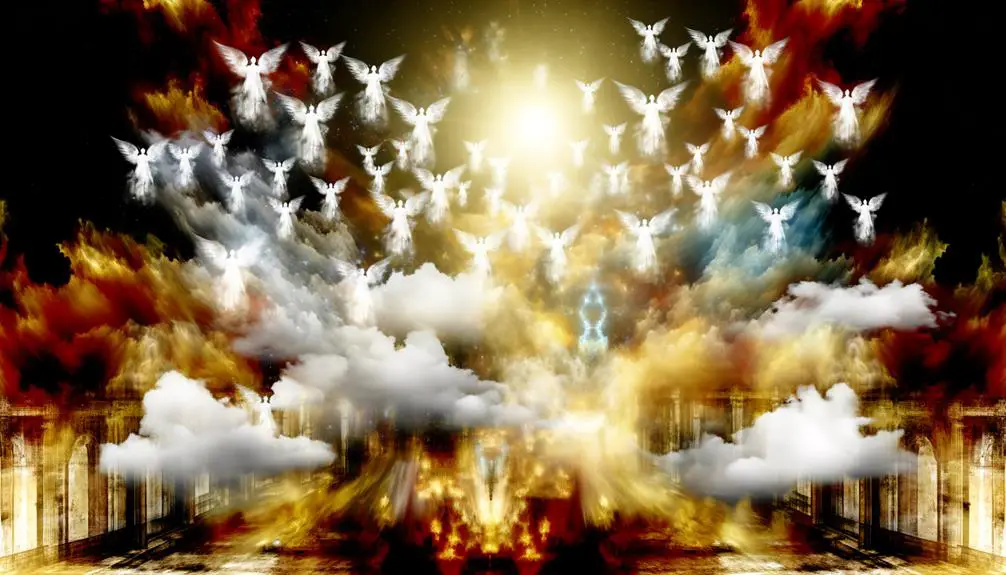
Shifting our focus to the Book of Revelation, we encounter a complex array of angelic beings that play critical roles in the unfolding of end-times prophecy and divine judgment. This apocalyptic text, rich in symbolic imagery, positions angels not just as messengers, but as executors of God's will, intricately involved in the events leading to the world's end.
You'll notice that angels are instrumental in the execution of the Seven Seals and Trumpet Judgments, pivotal moments that define the trajectory of Revelation's narrative. The Seven Seals, opened by the Lamb, unleash consequences upon the earth, with angels actively participating in these events. For instance, four angels are tasked with holding back the winds of the earth, preventing any wind from blowing on the land, the sea, or any tree, until the servants of God are sealed on their foreheads.
Similarly, the Trumpet Judgments showcase angels blowing trumpets to herald cataclysmic events, each trumpet unleashing a new level of divine retribution upon the world. These judgments, ranging from environmental catastrophes to the release of demonic forces, further emphasize the angels' role as agents of divine wrath.
Analyzing these passages, it's evident that angels in Revelation serve multifaceted purposes. They're not only messengers but also warriors and guardians of cosmic order, executing judgments that are both punitive and redemptive. Their actions, under divine command, highlight the sovereignty and justice of God, reinforcing the theme of divine retribution and the ultimate triumph of good over evil in the cosmic struggle.
The Role of Archangels
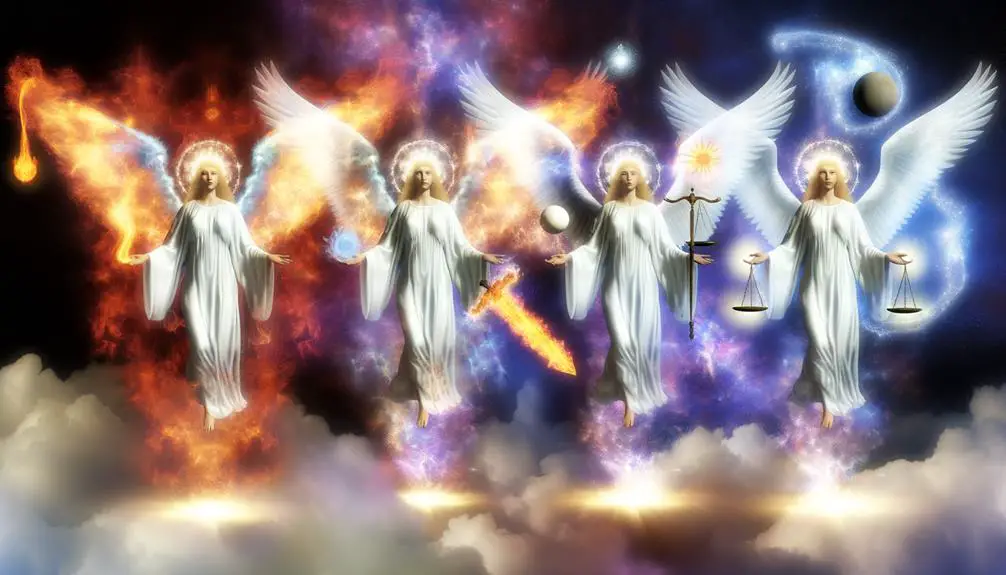
Exploring the biblical narrative further, we encounter archangels, distinguished beings whose roles transcend mere messaging to encompass leadership, guidance, and direct intervention in human and celestial affairs. These entities occupy a prominent position within the archangel hierarchy, serving as God's foremost messengers and warriors. Their celestial duties are multifaceted, reflecting their importance in the divine order.
- Leadership in the Celestial Hierarchy: Archangels hold a command position, orchestrating the activities of lesser angels to ensure the smooth execution of divine will across the universe.
- Guidance to Humanity: They provide critical guidance and support to key figures throughout biblical history, imparting wisdom and offering protection in times of need.
- Execution of Divine Justice: Archangels play a pivotal role in the execution of God's judgments, wielding power over life, death, and the natural order to enact divine decrees.
- Intermediaries Between God and Man: They act as bridge-builders, facilitating communication between the divine and the mortal realm, ensuring God's messages are delivered accurately and understood.
Archangels' roles are deeply embedded in the fabric of biblical theology, illustrating their significance not only in the spiritual realm but also in the direct impact they've on the course of human events. Their actions, as dictated by the archangel hierarchy, demonstrate a balance between mercy and justice, revealing the complexity of their celestial duties. As you delve deeper into the biblical accounts, you'll uncover a rich tapestry of stories that highlight the critical contributions of these celestial beings to the divine narrative.
Angelic Appearances in the Old Testament
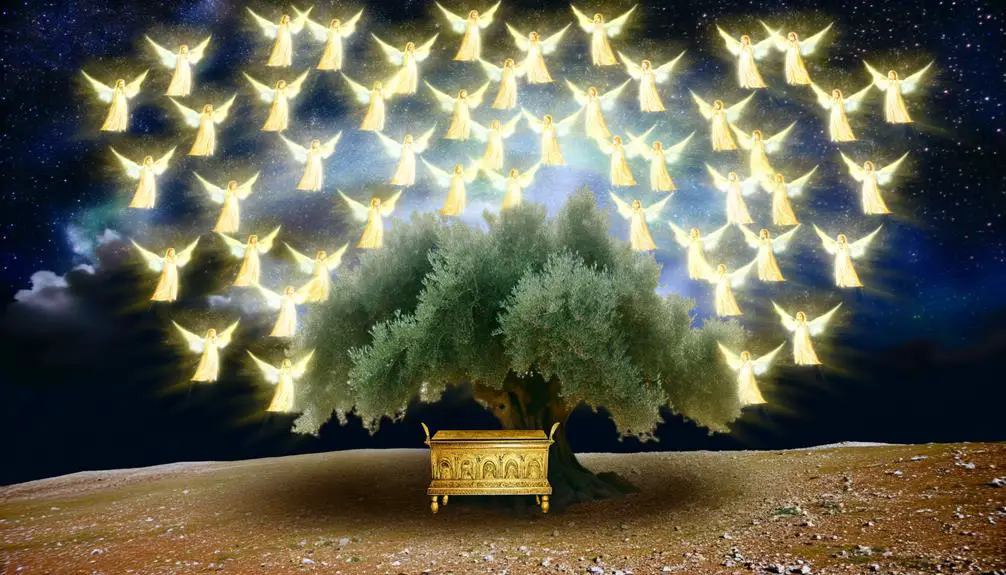
Building on our understanding of archangels' roles, we now turn our attention to the varied and profound appearances of angels in the Old Testament. The texts present angels not just as messengers or warriors, but as entities deeply integrated into the fabric of spiritual and, at times, physical realities. Their appearances are both awe-inspiring and enigmatic, offering glimpses into their nature and operations within the divine order.
The Old Testament doesn't extensively detail angelic diets, yet, through indirect references and interpretative traditions, it suggests a transcendence of physical sustenance. This aligns with their depicted purity and otherworldliness, setting them apart from human necessities and limitations. Their sustenance, if it can be termed such, is of a spiritual essence, derived from their unwavering service to the Divine, a concept that underscores their ethereal nature and devotion.
The origins of the Seraphim, a specific order of angels, are particularly fascinating. Rooted in the Hebrew word for 'burning ones,' the Seraphim's etymology points to their fiery nature, embodying purification and the presence of God. Their first detailed appearance in Isaiah 6 provides a vivid tableau of their role: surrounding the throne of God, they're involved in a ritual of purification, highlighting their integral role in the divine realm. This depiction emphasizes their transcendence and the awe-inspiring power of the divine, reinforcing the Old Testament's portrayal of a complex, hierarchical spiritual world.
Warfare in the Heavenly Realm

You'll find that the Bible portrays not just a world of humans and physical entities, but also a complex, unseen realm where angelic beings engage in fierce battles.
These narratives of angelic warfare reveal a cosmos marked by spiritual forces in conflict, highlighting the clash between good and evil beyond our physical senses.
The descriptions of these celestial skirmishes offer a profound insight into the spiritual dimensions influencing earthly events and human destinies.
Angelic Battles Described
Within the biblical narrative, angelic battles depict a complex interplay of divine forces, underscoring the celestial warfare that mirrors the moral and spiritual struggles on Earth. These confrontations aren't just about power; they're deeply entwined with divine strategy and moral implications.
Consider how these battles:
- Reflect Divine Will: Each skirmish is a manifestation of divine will, aiming to uphold righteousness.
- Showcase Divine Strategy: The tactics used by angels reveal a broader divine plan, emphasizing strategic interventions.
- Highlight Moral Implications: The outcomes underscore the consequences of moral choices, reinforcing the importance of aligning with divine principles.
- Demonstrate Spiritual Authority: They reveal the hierarchy and roles within the celestial realm, illustrating how spiritual authority is exercised.
These elements together paint a vivid picture of how angelic forces engage in cosmic battles, shaping the spiritual landscape.
Spiritual Forces Clash
Having explored the strategic and moral dimensions of angelic battles, we now turn our attention to the broader context of these conflicts, focusing on the warfare that unfolds in the heavenly realm. This isn't merely a clash of wills but a structured conflict playing out within a celestial hierarchy, where divine intervention isn't just possible, it's expected.
Aspect |
Celestial Hierarchy |
Divine Intervention |
|---|---|---|
Command |
Archangels |
Direct Edicts |
Tactics |
Angelic Legions |
Miraculous Acts |
Outcome |
Cosmic Balance |
Spiritual Renewal |
In this tableau, you're witnessing not just skirmishes but a complex interplay of power, duty, and faith. Each battle, each strategy underpins the ongoing struggle between cosmic order and chaos, overseen by a divine authority that ensures the scales are ultimately balanced.
Messengers of Prophecy and Vision

You'll find that angels play a crucial role in communicating divine prophecies and visions throughout the biblical narrative. Their appearances often serve as pivotal moments where they deliver messages that shape the course of human and divine interaction.
Angelic Visions Explained
Angelic visions, serving as divine messengers of prophecy and vision, play a pivotal role in biblical narratives, offering profound insights into the spiritual realm and God's communication with humanity. These visions often require careful interpretation, as they come laden with deep angelic symbolism that transcends straightforward understanding. To grasp their significance, consider:
- Vision interpretation is key to unlocking the messages conveyed by angels.
- Angelic symbolism often represents divine messages or truths.
- Understanding these symbols requires a blend of scriptural knowledge and spiritual insight.
- Each vision serves a specific purpose, often related to guidance, warning, or revelation.
In analyzing angelic visions, you're delving into a complex intersection of the divine and the human, where every symbol and message holds layers of meaning waiting to be uncovered.
Prophetic Messages Delivered
Building on our understanding of angelic visions, it's crucial to examine how these spiritual encounters deliver prophetic messages that shape the destiny of nations and individuals alike. Throughout the scriptures, angels have played pivotal roles as messengers of divine warnings and visionaries offering guidance. These celestial beings transcend the earthly realm to communicate God's will, ensuring that humanity remains aligned with divine intentions.
Their appearances often precede significant events, delivering messages that warn, guide, or reveal the future. The precision of their prophecies showcases not only the power of the divine but also the importance of human response to these heavenly directives. Through divine warnings and visionary guidance, angels serve as conduits of God's plan, emphasizing the interconnectedness of the spiritual and material worlds.
Frequently Asked Questions
How Do Different Denominations Interpret the Hierarchy and Roles of Angelic Legions in the Bible?
You'll find that denominational differences significantly influence how the hierarchy and roles of angelic ranks are interpreted.
For instance, Catholics might emphasize a more structured hierarchy, drawing from texts like Dionysius the Areopagite's 'Celestial Hierarchy,' while Protestants may focus less on the structured orders and more on the roles angels play in scripture.
Orthodox Christians often blend a respect for ancient tradition with a nuanced understanding of angelic roles, reflecting a rich theological perspective.
Are There Any Historical or Cultural Influences on How Angelic Legions Have Been Depicted in Biblical Translations Over the Centuries?
Absolutely, historical and cultural shifts have deeply influenced the portrayal of angelic legions. Artistic depictions and translation variations over centuries have shaped your understanding of these celestial beings.
Artists and translators, embedded in their time's cultural and theological contexts, have interpreted angelic legions through their lenses, leading to a rich tapestry of representations. This evolution reflects broader changes in society's views on spirituality and the divine.
How Does the Concept of Angelic Legions in the Bible Compare to Similar Entities in Other Religious Texts or Mythologies?
Exploring the realm of divine messengers, you'll find that biblical angelic legions have intriguing mythological parallels. These celestial envoys in various faiths aren't just winged beings; they embody moral and cosmological principles.
Comparatively, their roles and representations share a foundational similarity, yet each tradition infuses them with unique attributes and stories. This analysis reveals a rich tapestry of beliefs, highlighting the diverse yet interconnected nature of human spirituality and mythology.
Can the Presence of Angelic Legions Be Linked to Specific Historical Events or Periods as Interpreted Within Biblical Scholarship?
You're exploring if angelic interventions align with certain historical moments or eras, as scholars interpret. While the Bible doesn't explicitly map angelic legions to specific events, scholars analyze texts for implied connections.
Modern sightings and interpretations often draw parallels, suggesting these celestial beings influence historical outcomes. This analytical approach requires scrutinizing religious texts and historical accounts, seeking patterns or mentions that hint at divine involvement in human affairs during pivotal moments.
What Are the Theological Implications of Angelic Disobedience or Rebellion Within the Context of Angelic Legions, and How Is This Topic Addressed Across Different Biblical Passages?
Imagine a celestial rebellion, like stars falling from the sky. This metaphor captures the theological implications of angelic disobedience. Fallen angels challenge divine justice, sparking debates across biblical passages.
You'll find this topic delicately woven through scripture, illustrating the complex relationship between free will and divine order. Scholars dissect these narratives, revealing how divine justice ultimately prevails, despite the chaos sown by these celestial rebels.
It's a fascinating exploration of order versus chaos.
Conclusion
In exploring the biblical depiction of angelic legions, you've journeyed through a realm where celestial beings serve as guardians, warriors, and messengers. This investigation reveals a complex hierarchy and a dynamic involvement in human affairs, challenging simplistic interpretations.
By analyzing their roles—from guarding individuals to executing divine justice in Revelation—it's clear that angels embody a multifaceted divine agency.
This deeper understanding not only enriches one's spiritual insight but also invites further scholarly exploration into these heavenly hosts' profound impact on biblical narratives.



Sign up